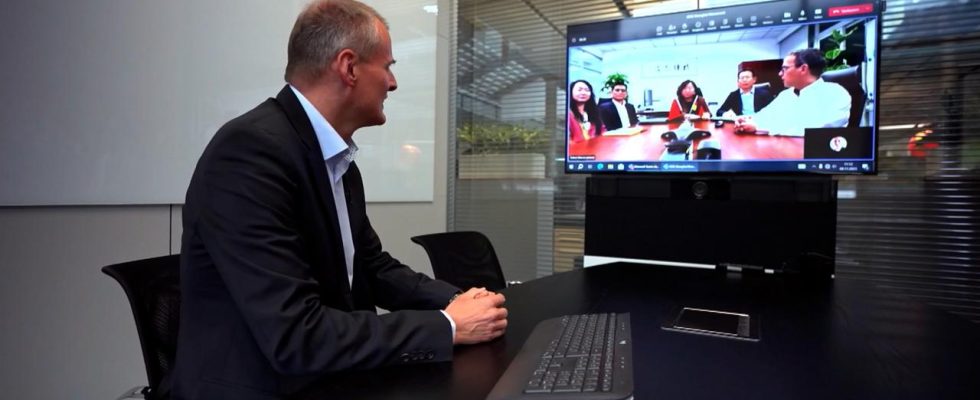German entrepreneurs’ concerns about their business in China are increasing. Companies are now changing their strategies: parts of the company should be able to be separated quickly in an emergency and supply chains should return to Europe.
Fans from ebm-papst are used all over the world. The world market leader from Germany has also been producing in China for almost 30 years. For the company from Mulfingen in southern Germany, the country is the second most important market. The factory near Shanghai also supplies fans to the Asian market.
Thomas Nürnberger, who has been responsible for the China business at ebm-papst for seven years, is slowly becoming too risky. He is implementing a program called “Decoupling China”. Concrete measures for emergencies are currently being prepared.
“We’re thinking about worst-case scenarios,” says the manager, who regularly travels to China. “We want to be able to completely decouple our IT systems within three months.”
In China only for China
The goal: to set up the local subsidiary so that it could continue producing independently. The strategy is called “In China for China”. The Chinese factory will produce almost exclusively for the Chinese market. In the future, other Asian countries will mainly be supplied from India and Singapore.
According to research by the ARD business magazine plusminus Other German medium-sized companies are currently preparing for possible geopolitical conflicts with “Decoupling China” measures. The aim is to minimize risks and at the same time secure tomorrow’s sales.
Politics demands less dependency
In July, the federal government published a strategy paper on China. Although the Asian country is Germany’s most important trading partner, they still want to avoid dependencies in the future, said Chancellor Olaf Scholz: “China remains a partner, competitor and systemic rival.”
Decades ago, China was still dependent on foreign investment, but today the economic power is more self-confident. According to economist Max Zenglein, German companies are now increasingly feeling the effects of this.
“Where in the last few decades we were complementary and China was primarily an opportunity for industry, we are now in competition,” says the China expert. “In some areas, China is already ahead of us. That’s part of the new reality of how we look at China, but also how China looks at us.”
More German investments
In order to make the Chinese part of the company more independent, ebm-papst is investing around 25 million euros in the China location. The time of global supply chains for production is over, says Thomas Nürnberger from the southern German fan manufacturer. “Many large countries, especially China and America, require so-called local content. A certain proportion of the added value must be generated within the country. So that government and state contracts can then also be addressed.”
This means that China is currently attracting a lot of investment because German companies cannot do without the Chinese market. Jürgen Matthes from the German Economic Institute warns that the Chinese economy could become even more powerful:
Ultimately, China is attracting more and more investment because companies feel they need to be able to isolate their Chinese business. This means that China benefits economically from the fact that our companies are less dependent on each other. What is invested in China is not exported from Germany. And that is paradoxical and not actually intended.
“China and Asia are indispensable”
Certain German industries are particularly dependent on supply chains from China – such as the bicycle industry. The Rose company from Bocholt assembles up to 200 bicycles every day. Almost all of the individual parts come from Asia, a large proportion from China.
If only two parts were missing, it would have a huge impact and you wouldn’t be able to finish building the bike, says Thorsten Heckrath-Rose. The family businessman is therefore very worried. “China and the Asian region in general are indispensable for the bicycle industry as a trading partner. If something were to happen there, at some point there would actually be no more bicycles.”
Worried about the competitiveness
In order to reduce dependency, Heckrath-Rose wants to purchase more individual parts from Europe. However, his experiences so far have been mixed. The supply chain has shortened, but “it takes a certain amount of time until the quality is at the level that we were used to in Asia and China. And if we want to be less dependent, then that will also cost money at the beginning more money.”
A dilemma: Customers would have to be prepared to pay a higher price for “Made in Europe”. Max Zenglein from the Mercator Institute therefore also warns of competitive disadvantages. “If you now prepare for risks and rely more heavily on new supply chains, then companies run the risk of essentially pricing themselves out of the market. Companies that don’t do this and continue to source more cheaply from China will then remain more competitive.”
Jürgen Matthes from the German Economic Institute therefore sees politics as responsible if necessary. “If we notice that far too few companies are reducing their dependencies with China and we remain too dependent on the economy as a whole, then we have to think about whether the state should not increase its support and accelerate ‘de-risking’ with guidelines.”
“Made in Germany” as a solution?
Together with medium-sized companies from outside the industry, Thorsten Heckrath-Rose’s team is currently developing a bicycle fork made of special plastics – “made in Germany”. This is a very active step to bring the supply chain back. “We also want to place emphasis on the use of recyclable materials. So this is double progress,” says the managing director.
A competitive Rose bicycle at a competitive price, with components entirely from Germany and Europe – but the manufacturer doesn’t expect this to happen for eight to ten years at the earliest. As long as the family business remains dependent on China.

